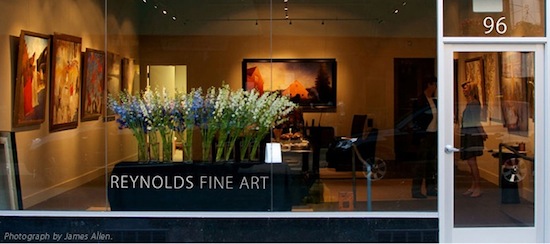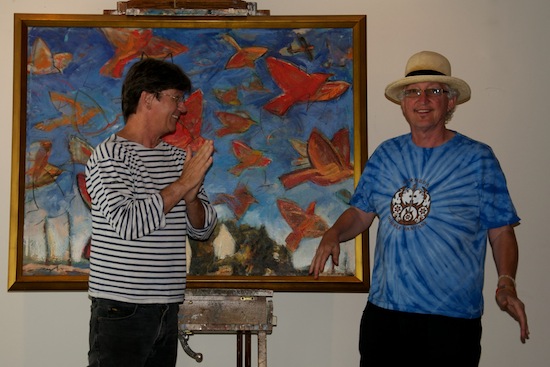I was lucky enough to meet Robert Reynolds off of the coast of Sicily while I was on a cruise this past month. Reynolds owns the Reynolds Fine Art Gallery in New Haven, Connecticut. I decided to do an interview with him because I wanted to share with you the perspective and experience of an unconventional entrepreneur. What follows is our exchange and why Robert's story was even more interesting and educational that I had originally expected.

SM: Tell me about how you make your living.
RR: I opened a gallery in New Haven on Orange Street, which is right by Yale's campus. We sell unique artists from around the country, photography, as well as my own work. I also have an exquisite section of traditional Japanese pottery, which I get from an artist in Vermont and some exceptional antiquities along with some gorgeous photography, including Sally Mann, Renaissance Press and Anastasi photogravures. This all happened through one of those delicious life collisions with the unknown. I am 59 years old, and two years ago a friend said, "Robert, I have empty space in downtown New Haven, would you like to do a gallery, we need to upscale the area?"
I had been painting for 30 years and thought it would be a lot of fun to show work I like and my own work. I then formed an LLC and got financing. I designed it and we built it out to incorporate existing steel girders blended with a very clean space to create an elegant modern gallery. I am very proud of it. We also do a substantial amount of corporate consulting which has been a lifesaver during the recent economy.
There is something special in making a workspace feel like one wants to work there.
SM: Have you had an impact on your neighborhood?
RR: Yes. We have two full time employees and three full time interns. We are open Tuesday through Saturday, from 10 until 6pm. We've created a lot of energy in the neighborhood. We have recently started working with the New Haven school system to introduce students to the art world and I am always stunned with the students reactions and questions that are both inquisitive and insightful.
SM: Robert, please tell me more about yourself.
RR: I am from Branford, Connecticut and I graduated from Branford high in 1971. I was very interested in drawing and art but my father discouraged it as most fathers would. I left home at 15 and rented a room and finished school and soon after graduating I started to travel and spent 10 plus years wandering Europe, America and Hawaii. Most of the time I was practicing my art in the form of 6x9 inch drawing books. However, I couldn't make my living. I was homeless a lot of the time. I was drinking as well. I saw the whole United States, Europe, Hawaii, Canada, and experienced quite a bit in Africa. At times I was a wee bit reckless and once had a close call from a hang gliding incident. I was always drawing though. Hour after hour everyday I would draw, practicing my art. I realized drawing was my primary language and speech was my second. In 1987, I became totally sober with the help of some very wonderful friends, changing my life, and I began to be able to make a living as an artist. I developed a real relationship with my art and I felt that I could communicate with other people through my soul. I focused on oil painting.
I paint nearly everyday, and have for the last 28 years. I have supported myself through my art for the past 20 years. My first real sale was for $1,000, which was like $10,000 at the time. I also illustrated medical textbooks, which I really enjoyed, as the human body is the most magnificent architecture. I enjoy traveling to other cultures as often as possible to refill the well of my artist soul. I stayed with the Tuareg and Berber tribes in Spanish Sub-Sahara and the Akha tribe of north Thailand. I fell in love with North Africa and traveling because it helped me see life in other terms other than middle-class American expectations.
Being unschooled, I am often asked where I was educated. My answer is invariably, " I went to the Empirical School, campuses everywhere," with a gentle smile, and 90 percent of my friends fall for that one.
SM: Tell our readers the top three tips you would give to young artists who want to make a living through their art.
1. Dedicate your life to your art and know that its worth it. This is what you are and how you can communicate with other human beings through your soul and the tools you choose.
2. Get a mentor. This is a particularly important tip because it is such a difficult endeavor to make a living as an artist. It can and usually is a painful road. The travel is full of hardships and you need a guide, someone to encourage you and save you from major errors. That is one of my regrets -- that I did not get a mentor. I was too peripatetic in life to settle down long enough to immerse myself in the cocoon of absorbing another's life lessons.
3. Be willing to accept failure because it will be part of your everyday life, as will rejection. You just have to stay true to your art.

I enjoyed hearing Robert's about his journey to be a successful small business owner. Robert told me that his goal is to help other artists to access their markets and make their livings. He left me with this beautiful quote from Aeschylus, the Greek philosopher:
"He who learns must suffer. And even in our sleep, pain that cannot forget falls drop by drop upon the heart, and in our own despair, against our will, comes wisdom to us by the awful grace of God."
